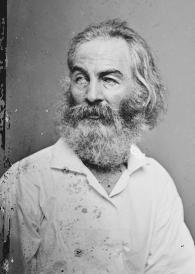1861 – Secession Completes and the Bloodshed Begins
The poem 1861 by Walt Whitman.
South Carolina seceded from the Union on December 20, 1860. In 1861, the Confederate States of America would gain its full roster of states. Here is a list of the seceding states and their dates of secession from the Union:
- South Carolina – December 20, 1860
- Mississippi – January 9, 1861
- Florida – January 10, 1861
- Alabama – January 11, 1861
- Georgia – January 19, 1861
- Louisiana – January 26, 1861
- Texas – February 1, 1861
- Virginia – April 17, 1861
- Arkansas – May 6, 1861
- North Carolina – May 20, 1861
- Tennessee – June 8, 1861
The Confederate States of America now exists. The blood of the Civil War starts flowing on April 12, 1861 as the Confederates fire on Fort Sumter. The Civil War begins.
For me, Whitman’s 1861 poem shows he knew the year of 1861 brought about a sea change. Before then, it was all about attempts at compromise, politicians debating and arguing, rattling of swords, and talk, talk, talk.Now the year 1861 brings about bloodshed and death with the gathering of men; “clothed in blue” and of “well-gristled body, and sunburnt face and hands,” with “a knife in the belt at your side,” and “bearing weapons.” Whitman says there should be “No dainty rhymes or sentimental love verses” for this “terrible year,” of 1861. War and all of its evil, has arrived for North and South.
It is for the reader to analyze and interpret Walt Whitman’s poem titled 1861, as he or she sees fit.
1861 – Walt Whitman
ARM’D year! year of the struggle!
No dainty rhymes or sentimental love verses for you, terrible year!
Not you as some pale poetling, seated at a desk, lisping cadenzas
piano;
But as a strong man, erect, clothed in blue clothes, advancing,
carrying a rifle on your shoulder,
With well-gristled body and sunburnt face and hands–with a knife in
the belt at your side,
As I heard you shouting loud–your sonorous voice ringing across the
continent;
Your masculine voice, O year, as rising amid the great cities,
Amid the men of Manhattan I saw you, as one of the workmen, the
dwellers in Manhattan;
Or with large steps crossing the prairies out of Illinois and
Indiana,
Rapidly crossing the West with springy gait, and descending the
Alleghanies;
Or down from the great lakes, or in Pennsylvania, or on deck along
the Ohio river;
Or southward along the Tennessee or Cumberland rivers, or at
Chattanooga on the mountain top,
Saw I your gait and saw I your sinewy limbs, clothed in blue, bearing
weapons, robust year;
Heard your determin’d voice, launch’d forth again and again;
Year that suddenly sang by the mouths of the round-lipp’d cannon,
I repeat you, hurrying, crashing, sad, distracted year.
A commentary about Walt Whitman by EnglishGuyinTexas.
